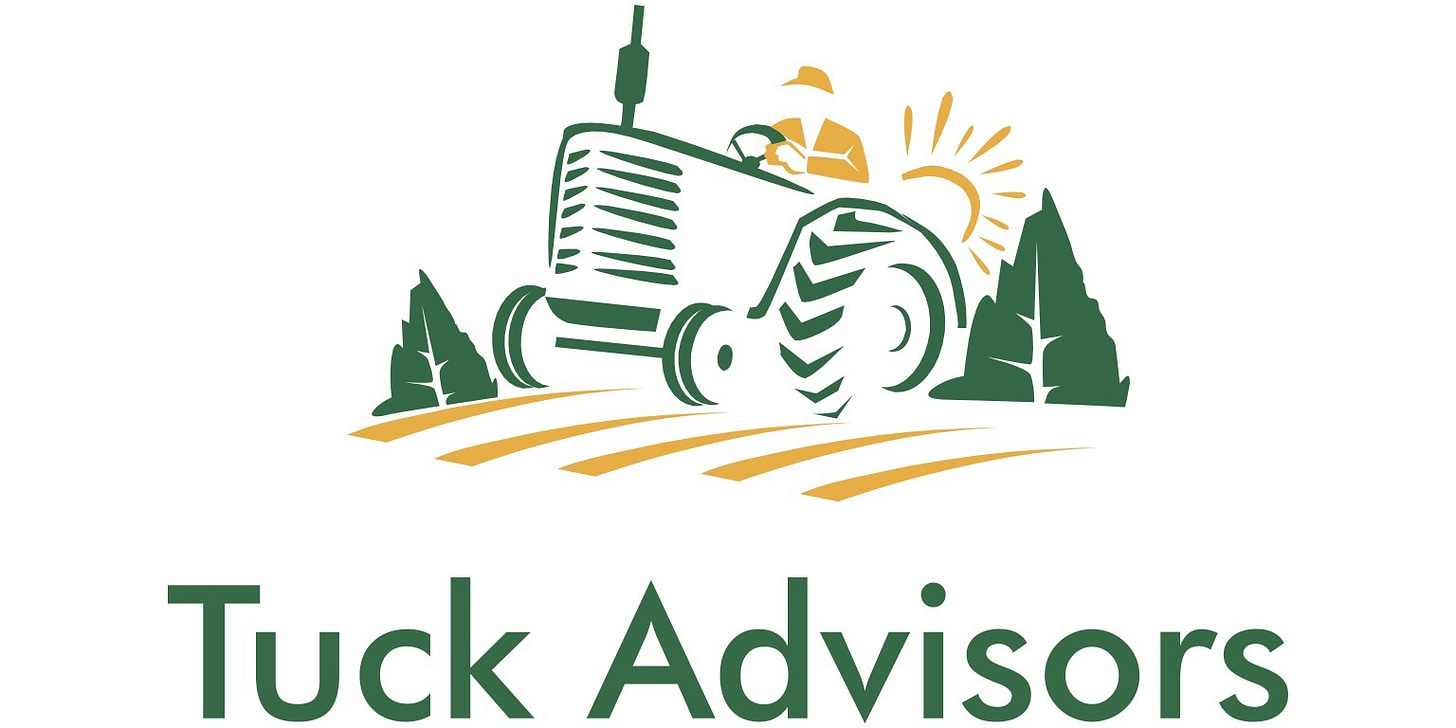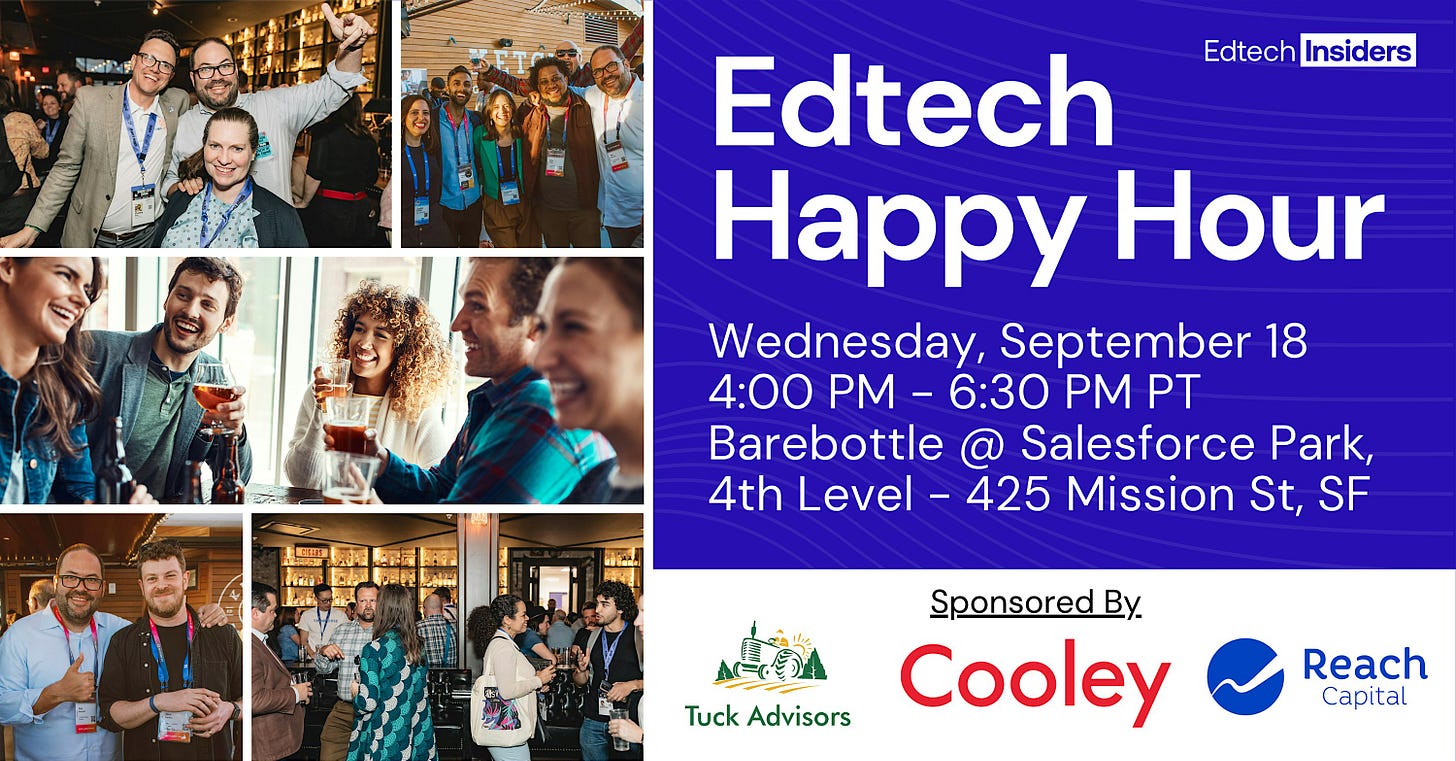Edtech VC Is Dead! Long Live Edtech VC!
Upcoming events with Edtech Insiders, an interview with Andrew Goldman of HMH Labs, ASU + Campus partnership, AI safety bills in CA, Yale announces $150 million AI project, and more!
Follow us on LinkedIn to be the first to know about new events and content!
Edtech VC Is Dead! Long Live Edtech VC!
By Ben Kornell
Picture a war scene straight out of Napoleon or The Patriot. As the smoke clears from two unprecedented and consecutive firestorms – the pandemic and the AI revolution – the reshaped edtech landscape emerges. Across the battered terrain school districts, colleges, and corporations are all bunkered down, scaled edtech players are fortifying their territory, and edtech start-ups are searching amidst the carnage for a pocket of safety. The smell of gunpowder still stings in the air, but wait – those that were once yelling “CHARGE!” are nowhere to be found. Where are the brash generals and imperious monarchs that financed this conflagration?
While the day-to-day realities of edtech may feel less cinematic, the question is no less dramatic: where are the VCs that fueled the rise of edtech from 2019 to 2022? How have we gotten to a place where the rivers of funding have seemingly run dry? How will edtech evolve now that funding levels have not only declined past pre-pandemic levels of investment, but even declined to the point of being comparable to 2008?
Whether it’s data from HolonIQ or Oppenheimer or Pitchbook, total VC investments in 2024 are down sharply from a peak of $20B in 2021 to a projected $5B this year, an 8-year low. If you’ve been paying ANY attention to edtech, this shouldn’t be a big surprise. Valuations are down, round sizes are down, and number of deals are down – hence a geometric deceleration in VC in the industry. Were it not for AI startups, we would be back to 2005-2008 levels of investing.
This is a nuanced and complex story, and to paraphrase Mark Twain, “the death of Venture Capital in Edtech has been quite exaggerated.” Of course there are still venture firms, GREAT venture firms, investing in edtech startups, with some notable rocketships like MagicSchool.ai and Ignite Reading commanding pandemic-level valuations from generalist VC shops (Bain Ventures and Goldman Sachs respectively). But the overall numbers don’t lie.
So where have all the VCs gone? What are they doing?
Goodbye, VC Tourists
Amidst the edtech tsunami in 2020-2022, generalist venture investors quickly tapped junior partners to dive into edtech. Those investors and their massive amounts of capital have receded with the tide. One paradigmatic example is Andreessen Horowitz – they emphasized education in “Time to Build” and their “American Dynamism” fund. The peak was 2022’s “The New Learning Economy” which positioned a16z to make HUGE bets in education. 18 months later, both the author and a16z’s lead edtech investor had quietly left the firm...
While there is still some generalist investor activity, any edtech investment faces significant scrutiny from investment committees, in part because of current market conditions, but also because edtech IPOs often don’t measure up to traditional tech IPOs. Recently a blue-chip VC partner who IS IN CHARGE OF EDTECH told me, “I only invest in companies that can get to $1B in revenue. The edtech TAMs (total addressable markets) are too small, the timelines are too long, and the exits too small.”
Hello, Owner-Operators
Venture capital firms buy equity to own part of the businesses they invest in. The traditional venture model sets targets of 20% ownership to drive optimal returns. Today’s Edtech VCs are throwing out that conventional wisdom to become owner-operators with equity stakes ranging from 40% all the way up to 80%. This can happen unintentionally as a function of down-rounds, where a cram down leaves remaining investors with a big chunk of the business. But several venture investor firms have taken a page from the private-equity playbook and openly embraced the ownership model from the outset: New Markets Venture Partners and Lumos Capital Group both actively pursue majority ownership in their financing deals. The driving hypothesis is that these firms have the expertise, network, and talent to help companies go from $10M to $20M or $20M to $40M in annual recurring revenue.
Owl Ventures, the largest Edtech Fund with $2B+ AUM (assets under management), has also made moves that signal an operating shift as their portfolio matures. They recently hired former Dreambox Learning CEO Jessie Woolley-Wilson as their first Operating Partner, as well as Lyman Missimer, who ran business development and M&A for Newsela. They are doubling down on existing investments… so far this year, they have invested in 9 follow-on deals, compared with only 7 new deals. This shift in portfolio construction is not surprising. In fact, a third of Owl’s $1B 2022 Fundraise was committed to follow-on deals, but now with valuations down, these subsequent rounds can come with much bigger equity stakes.
Hurry Up and Wait
Meanwhile, the main Edtech VC strategy seems to be… waiting. Founders report that rounds are taking roughly twice as long to close, for half the amount to raise, at half the valuation multiple. This may be healthy. First, investors may be more clear-eyed on their investment strategies and bring more conviction to rounds. Second, they may be waiting to see how the AI evolution will play out before deploying capital. In the meantime, many founders are asking whether raising a round is worth the brain damage and productivity loss. In addition to earned revenue, they are pursuing SBIR grants, competition prizes, NSF money, and other forms of non-dilutive capital.
While the waiting game seems to be prevalent, there are of course exceptions to this rule: the Oppenheimer report shows that Reach Capital has deployed $80M across 13 new deals and 7 follow-ons in 2024 YTD. This is not a “zig while others zag” move. Since inception, Reach has focused on early stage investments and they were also one of the first to invest internationally. This strategy has been a winner historically and seems advantageous now that valuations are reasonable and deal competition is lower.
Live To Fight Another Day
Ultimately, Edtech VCs are like the startups they fund: to survive and thrive, they must evolve and adapt to a fundamentally different market. Will the VC generals find a way to pull out a win from the aftermath of today’s bloody battlefield? It’s hard to say… but history tells us not to bet against them.
This edition of the Edtech Insiders Newsletter is sponsored by Tuck Advisors.
Since 2017, Tuck Advisors has been a trusted name in Education M&A. Founded by serial entrepreneurs with over 25 years of experience founding, investing in, and selling companies, we believe you deserve M&A advisors who work as hard as you do. Are you a founder thinking of selling your company? Have you received any UFO’s (unsolicited flattering offers) and need help determining if they’re real or hoaxes? We can help! Reach out to us at confidential@tuckadvisors.com.
Edtech Insiders Live Events
Product-Market Fit in Edtech Workshop
Join us on September 12 from 10-11 am PST / 1-2 pm EST for a deep dive on product-market fit in edtech! Hosted by our very own Alex Sarlin featuring product expert Matt Walton!
Matt is a product coach and advisor who works with edtech startups and scale ups. He also runs fellowship programmes on Finding Product-Market Fit in EdTech and Building Mission-Led Teams. He was one of the founding team and Chief Product Officer at FutureLearn, one of Europe’s biggest EdTech platforms partnering with hundreds of universities, growing it to 14m learners and securing over £50m in investment.
You don’t want to miss this one, RSVP at the link!
Bay Area Edtech Happy Hour
Our next Bay Area Edtech Happy Hour will be held at the Salesforce Park in San Francisco on September 18! Join Edtech Insiders, Reach Capital, Cooley, and Tuck Advisors to connect, collaborate, and enjoy a drink together!
We’d love to see you there, please RSVP if you plan to attend!
Top Edtech Headlines
1. Arizona State University Teams Up With Campus
Partnering with Campus, Arizona State University has launched a new initiative to provide two-year students with a streamlined path to earn their bachelor's degree. This program aims to enhance accessibility, flexibility, and affordability, offering a supportive bridge for students transitioning from community colleges to a four-year university education.
2. Yale Announces $150 million to Support Leadership in AI
Strengthening its commitment to shaping the future of artificial intelligence, Yale has announced a $150 million initiative to support leadership in AI research, education, and innovation. This landmark investment will focus on ethical AI development, interdisciplinary collaboration, and fostering the next generation of AI leaders.
3. Steph and Ayesha Curry: Don’t Let Pandemic-Era Tutoring Programs End
Urging philanthropists to continue pandemic-era educational support, Steph and Ayesha Curry have called for sustained funding of tutoring programs that emerged during COVID-19. The couple emphasizes that these initiatives are vital for addressing learning loss and ensuring equitable education for underserved communities.
4. California Legislature Passes AI Safety Bill
California's SB 1047, a groundbreaking AI safety bill, has cleared the state assembly and now awaits Governor Gavin Newsom's signature. The legislation aims to establish comprehensive guidelines for the ethical use and development of AI technologies, positioning California as a leader in regulating AI for public safety and innovation.
5. Here’s How Edtech Companies Pitch AI to Teachers
Ed-tech companies are increasingly promoting AI tools to teachers, positioning them as essential aids for personalized learning and classroom management. As these companies pitch AI solutions, they emphasize time-saving benefits and the ability to tailor educational experiences, though some educators remain cautious about privacy and long-term impacts on teaching.
6. Professor Tailored AI Tutor to Physics Course. Engagement Doubled.
A Harvard professor has developed an AI-powered tutor specifically tailored to a physics course, resulting in doubled student engagement. This personalized learning tool adapts to individual student needs, offering targeted support and enhancing the educational experience, showcasing the potential of AI to transform traditional teaching methods.
Join Edtech Insiders+
If you love Edtech Insiders and want to continue to support our work, consider becoming a paid subscriber! By joining Edtech Insiders+ you receive:
Early access to all Edtech Insiders events. No more sprinting to sign up for our monthly happy hours, edtech summits, and online conferences.
Access to our exclusive WhatsApp channel to connect with the Edtech Insiders community and discuss the latest trends and news in our space.
All proceeds from subscriptions will help us invest in our podcast, newsletter, events, and community. Our goal is to make Edtech Insiders an enduring and sustainable community offering that connects the edtech ecosystem!
We would be so excited if you decide to join us as a member of Edtech Insiders+.
Interview: Andrew Goldman
We have had some amazing guests on The Edtech Insiders Podcast in the last few weeks. One of our stand-out interviews from this past week is Andrew Goldman, EVP of HMH Labs, and former Co-Founder and CEO of Writable!
Here’s a deep dive on our interview with Andrew, and we encourage you to give the full episode a listen for more!
Journey from Game Design to Edtech
Andrew shares his unique transition from founding video game companies like Pandemic Studios, to becoming a leader in edtech. He explains how his background in creating immersive, interactive entertainment with companies like Activision influenced his approach to educational tools. His work in both industries emphasized engaging users through innovative experiences.
“In video games, there was an opportunity to create something that was entirely new. I had the good fortune out of college of meeting Bobby Kotick, the person who refounded Activision. I joined at a very early time...eventually we sold the development studio, and it became part of Electronic Arts. My mom said to me, ‘Okay, you’ve had your fun. Now do something that will make an impact.’”
- Andrew Goldman
Building Writable and Addressing Writing Challenges
Writable emerged from Andrew’s desire to address a major gap in education: helping teachers manage and provide feedback on student writing. He recognized that while students were writing more, teachers were overwhelmed by the volume, sparking the idea of a platform that leveraged peer review and AI to assist with feedback.
“We were getting students to write a ton...but we’d go back and visit teachers, and we’d find this frazzled teacher, overwhelmed by this fire hose of writing content that they were solely responsible for providing feedback on... Writable was born out of the idea that we could create a product to help teachers manage this.”
- Andrew Goldman
The Impact of Generative AI on Writing Instruction
Goldman highlights the evolution of generative AI and its growing role in Writable. Initially, the platform used AI for content generation and providing feedback on writing. As AI became more sophisticated, Writable used it to provide personalized, rubric-based feedback for students, significantly improving the teacher-student feedback loop.
“We started experimenting with generative AI in content generation, and the first step we took was in helping teachers create assignments... We then expanded into AI-driven feedback, and saw that with GenAI, the level of support for students grew dramatically compared to before.”
- Andrew Goldman
Symbiosis between Edtech Startups and Large Publishers
Writable’s acquisition by Houghton Mifflin Harcourt (HMH) allowed it to scale significantly. Andrew explains how small, agile startups can complement larger publishers, with startups focusing on user experience and innovation, and larger companies providing the reach and resources to bring products into schools.
“We created this symbiosis...Our pure focus on the teacher experience allowed us to innovate quickly. HMH was able to leverage its sales force to bring Writable into schools. Combining these strengths creates something much bigger than either company could have done alone.”
- Andrew Goldman
HMH Labs and the Future of Edtech Innovation
As EVP of HMH Labs, Goldman is spearheading efforts to develop new, AI-driven products. He describes how AI is poised to reshape education by offering real-time feedback and support to teachers. HMH Labs is experimenting with tools like “Classcraft,” which summarizes student responses and guides instruction.
“At HMH Labs, we are building AI capabilities that transform curriculum and the classroom...We’re bringing the data, student work, and curriculum together to provide personalized support to teachers and students. This is the next step in leveraging AI to truly enhance education.”
- Andrew Goldman
Curious to Learn More?
You can listen to our full interview with Andrew Goldman, as well as interviews with many other edtech founders, investors, and thought leaders at The Edtech Insiders Podcast! Check it out, and as always, we’d love to hear what you think!













